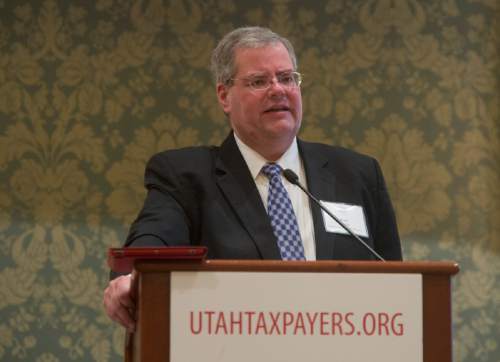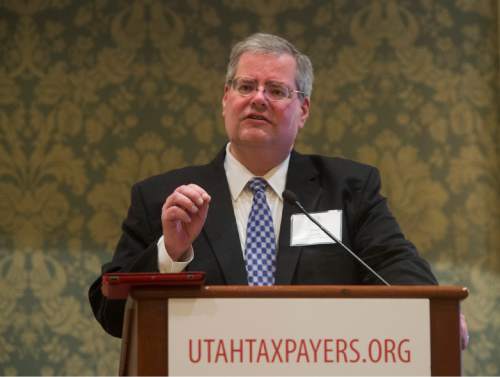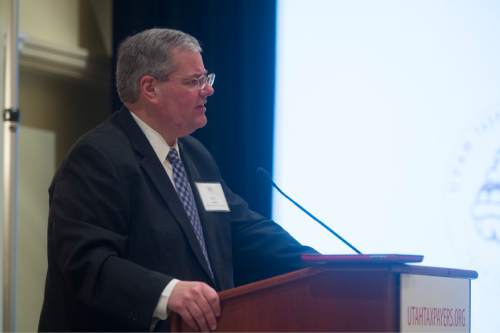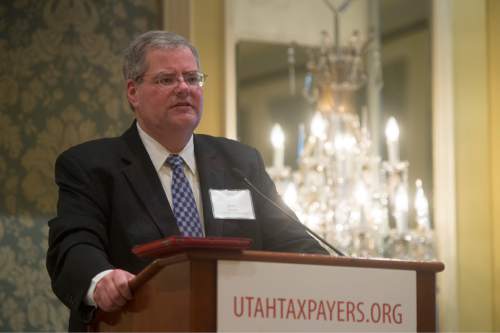This is an archived article that was published on sltrib.com in 2015, and information in the article may be outdated. It is provided only for personal research purposes and may not be reprinted.
According to state Superintendent Brad Smith, the single most important change in Utah public education can be put in place immediately at no cost to taxpayers.
"It is to have faith," he said. "Faith that we can change this very big, very complex system in a way that benefits our kids."
Smith's comments came Thursday during the Utah Taxes Now conference at Grand America Hotel in Salt Lake City. The annual event, hosted by the Utah Taxpayers Association, featured several speakers who spoke about education funding and the growth of charter-school enrollment.
But Smith said policymakers should focus less on how much money goes into schools and more on prioritizing learning outcomes.
He was critical of perennial and generic requests for more school resources and the "same old tired statistic" that Utah ranks last in the nation in per-student education funding.
"There is no virtue in rising higher on that list," he said. "And there is no particular vice in being low on it."
More important, he said, is the academic achievement of Utah's students, thousands of whom will graduate this year and head into careers or higher education.
"As they march across those stages, only one in four of the graduating seniors [is] fully prepared to succeed in college," Smith said. "Whatever we do about funding, whatever we do about taxes, whatever we do about everything else, we must galvanize action to say that cannot, that will not stand."
Smith, who was appointed state superintendent in October, was recently embroiled in controversy for criticizing the way educators, and particularly teachers' unions, ask for school funding. In March, he posted an open letter on the Utah State Office of Education website apologizing for a comment he made on the last day of the legislative session that compared pro-education supporters in the Capitol Rotunda to children crying for more presents on Christmas morning.
On Thursday, Smith said he and the state school board are committed to a "vision of change." He said the next few weeks will provide a second batch of scores from the state's year-end testing system, which will give educators and policymakers a sense of how Utah students are performing.
"It's critical that we are committed to data-driven decision- making that is predicated on actual results," he said.
In addition to Smith's comments, the conference featured a discussion of Utah's charter schools and the way funding is distributed. Income tax revenues are distributed equally on a per-student basis. But school districts are required to share a portion of their property tax revenues with charter schools in their boundaries.
That revenue sharing has created a "political hot potato," according to state Rep. Kraig Powell, R-Heber, as districts are forced to collect taxes for schools they don't oversee.
To solve that tension, Powell said, he plans to reintroduce a bill at next year's legislative session that would create a distinct property tax for charter schools.
"It's a new tax," he said, drawing chuckles from the Taxpayer Association crowd. "I ask, what's not to like?"
Howard Headlee, a member of the state charter school board, said the mission of charter schools is more about being labs for educational innovation than it is about competing with and offering an alternative to traditional schools.
He said charter-school funding should be focused on encouraging innovation. Making charter schools equal to school districts, Headlee added, potentially hurts taxpayers.
"We have a hard time funding one public education system in Utah," he said. "We are not here to create a parallel system of education. We're trying to explore ways to make the system that we have better."









